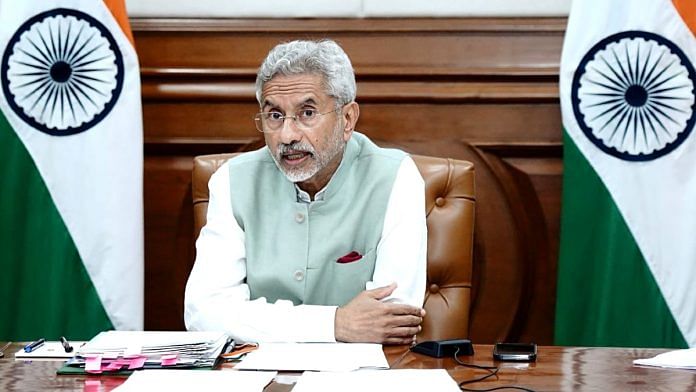New Delhi: From setting up a potential rail link between Bhutan and Assam to letting Nepal and Bangladesh use India’s transmission grids for cross-border electricity trade, India’s Northeast will change dramatically over the next decade due to increased border area development, External Affairs Minister Dr S. Jaishankar said Monday morning.
Speaking to a select group of journalists, the foreign minister explained India’s future and ongoing plans to ramp up border infrastructure with neighbours including Nepal, China, Bangladesh, Myanmar and Sri Lanka.
He consciously avoided touching on Pakistan as he said it poses a “very different situation”.
The foreign minister made a distinction between the nature of border infrastructure with China and that with other neighbouring countries where according to him the focus is “not on deploying troops” but promoting economic activity and people-to-people exchanges.
“Border areas proximate with China is where national security is the predominant concern,” he said, adding that the budget for border infrastructure jumped from Rs 3,200 crore in 2008 to a projected Rs 14,387 crore in 2023.
Bilateral ties between India and China remain frosty due to the border standoff in eastern Ladakh, which continues despite several rounds of corp commander-level talks between the two sides. In March this year, Army chief General Manoj Pande remarked that Beijing is building border infrastructure at “a very hectic pace” and has not reduced the presence of troops along the Line of Actual Control (LAC). Following the clash between Chinese and Indian troops in western Arunachal Pradesh last December, satellite images showed that Beijing has built villages and a road on its side of the border abutting Tawang.
According to Jaishankar, 16 passes essential for security in Ladakh and Kashmir are in “much more operational conditions” than before.
The Border Roads Organisation (BRO), he explained, is looking to construct 70 new roads in border areas in the Northeast, including an 1,800km-long road across the length of Arunachal Pradesh at an estimated cost of Rs 30,000 crore.
“The Northeast, in the coming decade, will change because of the logistics of the area…a lot of options closed to them after 1947 and after 1965 — that are today open,” he said.
Jaishankar on power deal with Nepal, Bangladesh
During his remarks at the Jawaharlal Nehru Bhawan in Delhi, the external affairs minister also spoke about the three-way power deal between India, Bangladesh and Nepal which is expected to reshape the energy landscape in South Asia.
“We have now agreed to facilitate a flow of Nepal-generated power to Bangladesh. This will go through our grids…border areas will benefit because it’s easier and cheaper to get power from Nepal…(instead of) coming from a greater distance (within India),” Jaishankar said.
India and Nepal share a dozen transmission lines of varying capacities — ranging from 33kV to 132kV and as high as 400kV.
Two days prior, Prime Minister Narendra Modi and his Nepalese counterpart Pushpa Kamal Dahal ‘Prachanda’ discussed bilateral cooperation over the phone, revisiting discussions held during the latter’s visit to India, held from 31 May to 3 June. The visit was aimed at bolstering the partnership between the two nations and deepening their bonds of friendship, according to an official release from the Prime Minister’s Office (PMO).
Speaking on ties with Myanmar, the foreign minister expressed concerns about the trilateral highway with Thailand that has faced delays since the military junta grabbed power in Naypyidaw in February 2021. “(The project) is facing challenges,” he said.
He, however, added that the India-financed Sittwe port is still functional and that India and Myanmar are looking to ink a coastal shipping agreement which could benefit states like Andhra Pradesh and Odisha.
This comes three weeks after Jaishankar met his Myanmarese counterpart Than Swe on the sidelines of the Mekong Ganga Cooperation (MGC) Mechanism meeting in Bangkok where the two discussed efforts to expedite projects, including the trilateral highway.
The foreign minister also revealed a rail link between eastern Bhutan and Assam is in the pipeline.
“We have a long tradition of importing electricity from Bhutan…we are looking at a rail link from eastern Bhutan to Assam. We are talking and encouraging the government of Assam (on this),” he said, adding that this could boost tourism between the two countries.
(Edited by Amrtansh Arora)



